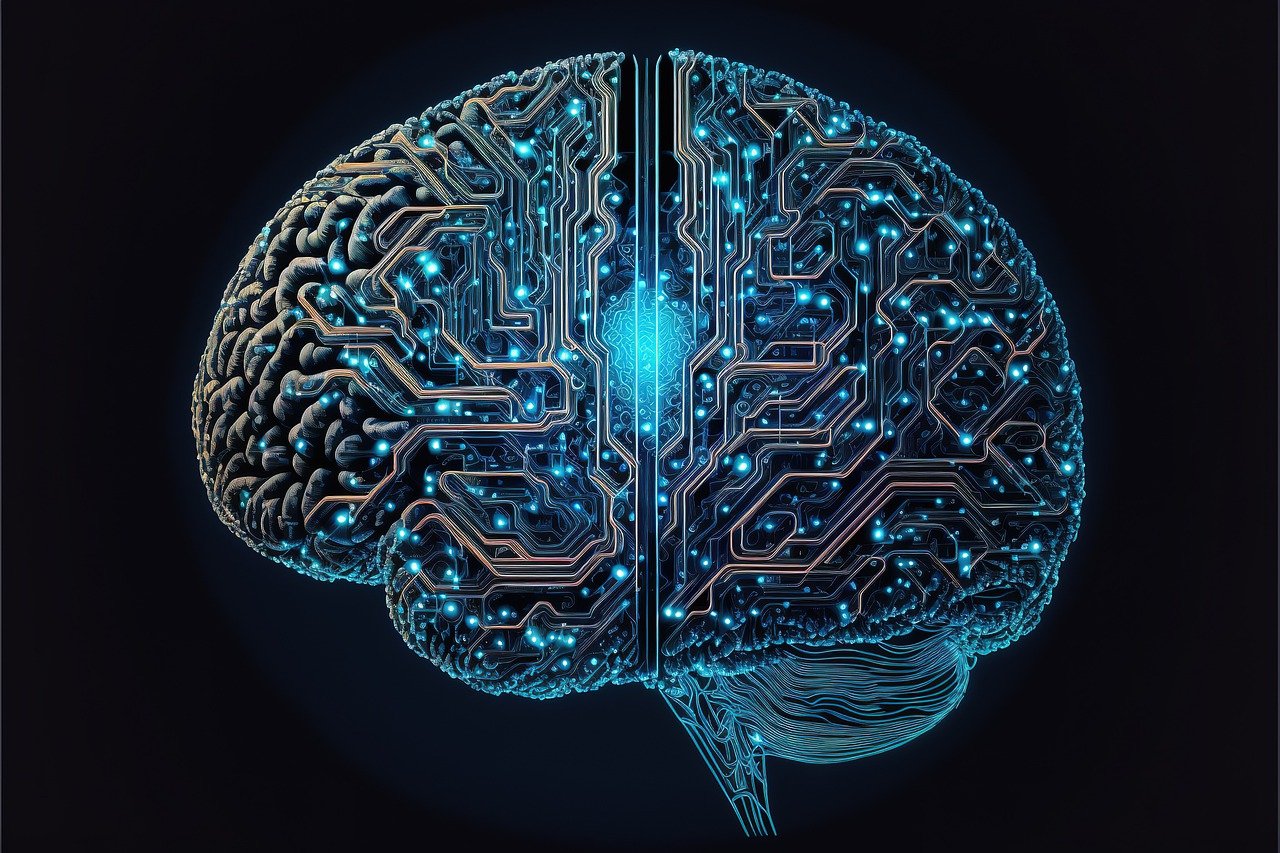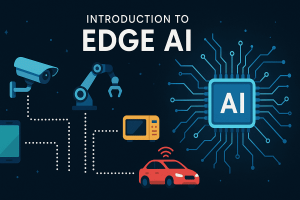For the longest time, artificial intelligence (AI) remained as a buzzword – banking on potential and possibilities but not actually generating results. It felt like nothing by a sci-fantasy at some point. Nothing but an elusive vision of the future rather than a present-day reality.
Not until today, at least.
An AI revolution is underway, and it’s affecting every single aspect of our lives, from the way we work to how we engage with technology at home. There’s no denying that the impact of artificial intelligence is becoming increasingly pervasive.
Virtual assistants like Siri and Alexa anticipate our needs, recommending movies, predicting traffic patterns and even assisting in personal health monitoring, while social media platforms leverage AI algorithms to curate content tailored to our preferences, creating a personalized digital experience.
While in the corporate realm, it’s optimizing operations, streamlining processes, and aiding decision-making. It’s more than just the automation of mundane tasks now. AI is reshaping entire industries, driving innovation, and fostering a new era of efficiency and productivity. And that’s exactly what we’ll delve into today – AI in business.
We’ll give you a thorough look at how AI is changing businesses today and shaping the path forward. But while we celebrate AI’s benefits, we’ll also explore important questions about ethical and responsible use of advanced technology. Recognizing that the integration of AI into business necessitates a delicate equilibrium between progress and ethical considerations is a vital awareness for everyone looking to utilize the technology.
Understanding Artificial Intelligence (AI)
Before we go into the impact of AI in business, it’s important to first understand what the term “Artificial Intelligence” really means. In many people’s minds, AI may refer simply to self-acting robots without sentience, but it’s actually more than that.
At its core, AI refers to computer software designed to perform tasks that typically require human intelligence, encompassing capabilities such as learning, planning, and problem-solving. The goal is to create machines that can simulate and replicate human-like cognitive functions, enabling them to adapt to different situations, learn from experience, and improve their performance over time.
There are two main types of AI:
- Narrow or Weak AI – This type of AI is designed and trained for a specific task or a narrow set of tasks. It operates within a limited context and does not possess general intelligence or the ability to perform a wide range of unrelated tasks.
- General or Strong AI – General AI refers to machines with the ability to understand, learn, and apply knowledge across diverse domains, much like a human being. This level of AI remains a theoretical concept and has not yet been achieved. It involves creating machines that can perform any intellectual task that a human can.
AI can be further categorized into different approaches and techniques, including:
- Machine Learning
This is a subset of AI that focuses on developing algorithms and models that enable computers to learn and make predictions or decisions without being explicitly programmed for specific tasks. In traditional programming, humans provide explicit instructions to computers, telling them exactly what to do. In contrast, in machine learning, computers learn from data and improve their performance over time through experience.
- Natural Language Processing (NLP)
NLP focuses on the interaction between computers and human language and is the foundation of large language models (LLMs). Its primary goal is to enable machines to understand, interpret, and generate human-like text, facilitating more seamless communication between humans and computers. NLP plays a pivotal role in transforming unstructured language data into a format that machines can comprehend to extract valuable insights, improve customer interactions, and enhance operational efficiency.
- Computer Vision
Computer vision empowers machines to interpret, analyze, and understand visual information from the world. The primary objective of computer vision is to enable computers to replicate human vision capabilities. It allows them to make sense of images, videos, and other visual data.
Computer vision systems typically rely on deep learning techniques, such as Convolutional Neural Networks (CNNs), to extract hierarchical features from visual data. These features are then used to make predictions or decisions and respond to the visual world in a manner analogous to human vision.
- Expert Systems
Expert Systems are designed to emulate the decision-making abilities of a human expert in a specific domain. These systems use a knowledge base, which contains domain-specific information and expertise, and an inference engine, which applies logical reasoning to draw conclusions or make decisions based on the available knowledge.
The Role of AI in Business Operations
As organizations strive for efficiency, innovation, and competitive advantage, AI integration has become a pivotal aspect of their success. Below, we explore keyways it contributes to and revolutionizes business operations:
Automation of Repetitive Tasks
AI technologies, particularly robotic process automation (RPA), enable businesses to automate routine and repetitive tasks. This not only enhances operational efficiency but also allows human resources to focus on more strategic and creative aspects of their roles.
Predictive Analytics for Decision-Making
AI-driven predictive analytics harness the power of machine learning algorithms to analyze vast datasets, identify patterns, and make accurate predictions. Businesses can leverage this capability for informed decision-making, risk management, and strategic planning.
Supply Chain Optimization
AI plays a crucial role in optimizing supply chain operations through predictive algorithms. It helps forecast demand, manage inventory levels, and streamline logistics. This ensures timely deliveries, minimizes disruptions, and enhances overall supply chain efficiency.
Customer Service and Interaction
Virtual assistants and chatbots powered by AI have transformed customer service operations. These systems can understand natural language, provide instant responses, and handle routine customer queries. This not only improves customer satisfaction but also reduces the workload on human support agents.
Personalization and Marketing
AI algorithms analyze customer behavior, preferences, and historical data to deliver personalized experiences. From targeted marketing campaigns to personalized product recommendations, AI enhances customer engagement and drives sales.’
Fraud Detection and Security
It’s also instrumental in strengthening cybersecurity measures by detecting anomalies and potential threats in real-time. Machine learning models analyze patterns of behavior to identify unusual activities, providing businesses with advanced security measures.
Data Processing and Insights
The sheer volume of data generated by businesses today necessitates advanced processing capabilities. AI facilitates the efficient analysis of big data, extracting valuable insights that inform strategic decision-making and business planning.
Human Resources Management
AI is employed in human resources for talent acquisition, employee engagement, and performance management. Automated processes streamline recruitment, while sentiment analysis tools gauge employee satisfaction and well-being.
Workflow Optimization
AI-powered tools can optimize workflows by identifying bottlenecks, automating document handling, and streamlining approval processes. This results in faster and more efficient operational workflows.
Continuous Learning and Improvement
AI systems can continuously learn and adapt to changing circumstances. Through machine learning models, businesses can refine their operations, incorporating insights gained from ongoing data analysis to improve efficiency and effectiveness.
In summary, the integration of AI in business operations is no longer a luxury but a necessity for staying competitive in today’s dynamic business environment. As technology continues to advance, businesses that harness the power of AI are poised to achieve higher levels of productivity, innovation, and strategic success in their operations.
10 Effects of AI in Business
As AI assumes these functions, businesses undergo transformative changes that affect various facets of their operations. Here are the primary effects of AI in business:
- Increased Efficiency and Productivity – AI enhances efficiency and productivity by automating tasks and streamlining workflows.
- Cost Savings through Automation – Automation powered by AI leads to significant cost savings in labor-intensive processes.
- Enhanced Customer Experience – AI-driven solutions create personalized and responsive customer experiences, fostering loyalty.
- Strategic Decision-Making with Predictive Analytics – Predictive analytics empowers businesses to make informed and strategic decisions based on data.
- Innovation and New Revenue Streams – AI fosters innovation, enabling businesses to explore new products, services, and revenue streams.

- Improved Cybersecurity – AI enhances cybersecurity by detecting and responding to security threats in real-time.
- Adaptability to Market Trends – AI enables businesses to adapt swiftly to changing market trends through data analysis.
- Optimized Supply Chain Management – AI optimizes supply chain operations, reducing costs and improving logistics.
- Job Transformations and Skill Requirements – The integration of AI transforms job roles, requiring skills in AI management and data analysis.
- Ethical and Regulatory Considerations – Businesses must navigate ethical and regulatory considerations related to AI implementation.
The effects of AI in business are multifaceted, influencing operations, decision-making, and the overall competitive landscape. Understanding and harnessing these effects strategically is crucial for sustained success and innovation.
Implications of AI in Business for Human Workers
Given its profound impact and widespread applicability across industries, it’s only natural for human workers to contemplate the implications for their roles. Are they on the brink of being replaced, or should they eagerly embrace the exciting possibilities that AI can unfold?
Spoiler alert: It’s the latter
It’s crucial to recognize that AI, at its core, is a tool — a powerful one, but a tool, nonetheless. It thrives under human facilitation, and this is where the indispensable role of humans comes into play.
The ongoing narrative of adaptation does not signify replacement. Rather, it highlights the increasing importance of upskilling and continuous learning. Acquiring new skills, particularly those in the realm of AI, becomes paramount for fostering effective human-machine collaboration.
Here’s the key revelation: the AI revolution not only demands adaptation but also opens up new exciting opportunities. Human workers are encouraged to explore roles in AI development, oversight, and maintenance. These positions, requiring expertise in AI, not only contribute to job market diversification but also redefine the landscape of professional opportunities.
Far from facing redundancy, human workers are presented with the chance to thrive in a collaborative future where their skills complement the capabilities of AI, leading to a harmonious coexistence and a more enriched, technologically empowered workforce.
5 Considerations for Successful Adoption of AI in Business
To alleviate concerns among existing workers and enhance the likelihood of success, businesses must carefully consider the following aspects throughout their AI adoption process:
Clear Business Objectives:
Clearly defining business objectives is the foundation for successful AI adoption. It involves identifying specific goals that AI will address, such as improving operational efficiency, enhancing customer experiences, or optimizing decision-making processes. These objectives serve as guiding principles throughout the adoption journey, ensuring a focused and purpose-driven integration of AI into business operations.
Data Quality and Security
High-quality data is the lifeblood of AI applications, so ensuring data accuracy, relevance, and accessibility is critical for effective AI performance. Robust data security measures, including encryption and access controls, safeguard sensitive information. This dual emphasis on data quality and security builds a solid foundation for trust and compliance – essential elements in the successful deployment of AI solutions.
Employee Training and Change Management
Employee readiness is pivotal for the seamless integration of AI. Investing in comprehensive training programs equips the workforce with the skills needed to interact with and manage AI technologies. Simultaneously, effective change management strategies address potential resistance to organizational shifts, fostering a positive attitude toward AI adoption. This dual approach ensures that employees not only understand the technology but also embrace its role in enhancing their work environment.
Ethical and Regulatory Compliance
Ethical considerations and adherence to regulations are central to responsible AI adoption. Addressing biases in algorithms, ensuring transparency in decision-making processes, and prioritizing user privacy are essential ethical considerations. Staying informed about and complying with evolving regulatory frameworks governing AI applications is equally crucial. By embedding ethical principles into AI practices, businesses build trust with users, avoid legal pitfalls, and contribute to a positive societal impact.
Scalability and Flexibility
Choosing AI solutions that are scalable and adaptable is imperative for long-term success. Scalability ensures that AI systems can handle increasing data volumes and evolving business requirements. Flexibility enables seamless adjustments to accommodate technological advancements and changing organizational needs. Selecting solutions that grow with the business and easily integrate with existing processes allows businesses to position themselves for sustained success in the ever-evolving landscape of AI technologies.
By taking a thoughtful and strategic approach to these considerations, businesses can navigate the complexities of AI adoption, ensuring a successful integration that not only enhances operational efficiency but also aligns with broader organizational goals.
The Future of AI in Business
With its myriad applications and undeniable benefits, Artificial Intelligence (AI) has woven itself in the fabric of modern business. The conversation has gone beyond the question of what AI can offer; it now centers on how organizations can strategically embrace this technology to unlock its transformative power.
The answer lies in human-machine collaboration.
AI elevates the roles of human workers by automating routine tasks, fostering an environment where creativity, critical thinking, and emotional intelligence take center stage. The collaborative synergy between human ingenuity and AI-driven capabilities promises a future where the workforce is empowered, organizations thrive on data-driven insights, and technological advancements reshape the business landscape.
The possibilities are boundless.
By boldly venturing into the expansive realm of AI, businesses position themselves to confidently navigate the future. This journey opens doors to unprecedented opportunities, paving the way for sustainable success in an era where innovation, adaptability, and the seamless integration of human and machine capabilities define the new frontier of business evolution.
Integrate AI tools to your business today and see how artificial intelligence can make your business grow in potential.









